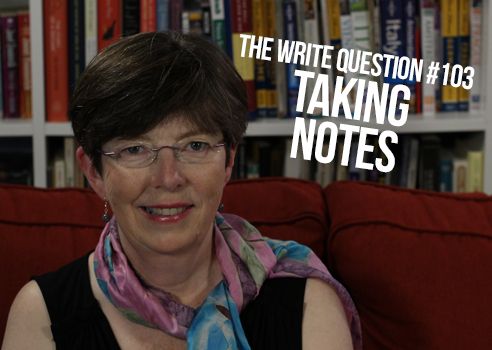Viewing time: 5 mins. 19 secs.
The Write Question is a weekly video podcast about writing that I started in 2017 and that ran, more or less weekly, until April 2022. This is a republication of issue #103, which discusses how to take notes when reading. The post first ran on Aug. 9/19.
Transcript:
Welcome to The Write Question, I’m Daphne Gray-Grant and today I address the topic: how to take notes when reading.
I have a question from Debbie Garrity — a Chicago based business owner. Here’s what she’s asked via email.
“How do you write notes when reading a book?”
Some people might be foolish enough to think this is a silly question with an obvious answer, like “pick up a pencil.” But it’s not that simple! This question actually shows your sophistication, Debbie.
Let me give you a step-by-step guide on how to take notes while reading.
First, decide what level of reading you want to do. Obviously, a John Grisham or Danielle Steel book doesn’t deserve the same attention as, say, The 7 Habits of Highly Effective People by Stephen Covey, link below.
So, determine your purpose. With the 7 Habits book, for example, figure out ways to change your own behaviour. Keep that goal in mind, while you’re reading.
Some novelists might want to learn from their predecessors. So, for example, if you’re writing a novel and you think Barbara Kingsolver is a great novelist, then you’ll want to take extra-careful notes when reading her books. Again, remind yourself of your specific purpose and be sure to watch for it.
For example, you might want to investigate how that author uses figurative language. Or you might want to see how they manage the plot. Again, every reader’s goal is going to be different and every note-taker’s methods will need to adapt to that goal.
One you’ve determined your purpose for any particular book, begin by taking five minutes to look it over. Read the front and back jackets. Read the table of contents. See how many chapters there are. Skim the index if the book has one. These steps will help familiarize you with the book, and if it seems too lightweight or not suitable it may allow you to skip reading it.
Once you start reading, be sure to have a pen or pencil in hand. I love taking notes in books that belong to me. They help make the book mine. I underline words and phrases and use stars to mark anything I really want to remember.
If the book belongs to the library, or a friend, or if it’s on my Kindle, I read with my cellphone beside me and take photos of anything I want to remember. This is a really useful habit to develop.
If you’re the type of person who abhors the idea of writing IN books, then maybe you should just go directly to the photo-taking method. One other alternative is to have a small notepad or a stack of index cards beside you.
Then, at the end of every chapter, write yourself a summary statement of what you learned in that chapter. Jot down two or three important points that you want to be sure to remember.
This last step is especially useful if your record keeping involves photographs: because you won’t have taken notes in the book, it will be even more important for you to cement your impressions while they are still fresh in your mind.
Once you’ve finished the book, give yourself a couple of days to let the material incubate. Then, review all the notes you’ve taken and passages that you’ve underlined. At this point, write a one-paragraph summary that brings together all your notes from each chapter.
Finally, you’ll need a place to store all of this material. Being organized about where you keep your records will help you get the most use out of them.
I like to use Evernote which is a digital based system that allows me to capture everything — from text to webpages to photos — quickly and easily. One other great thing about Evernote is that it allows you to “tag” all entries. Essentially, this means that you’re building an index on the go, so it will be really easy for you to find the information you enter later. See my link below for more details about Evernote.
I admit there’s nothing terribly profound or surprising about the process I suggest. Instead, it’s just a disciplined and common-sense way of tracking the information you spend time reading.
Finally, let me wrap up with a quote from American writer, editor and literary critic, Edgar Allan Poe: “Marking a book is literally an experience of your differences or agreements with the author. It is the highest respect you can pay.”
Debbie, taking good notes while you are reading isn’t complicated. But it requires determination and discipline. The rewards, however, are many.
Links
The 7 Habits of Highly Effective People by Stephen Covey
9 business tools I adore (see: Evernote)


